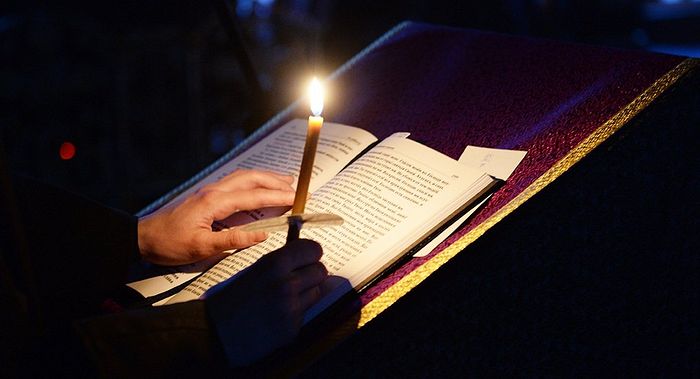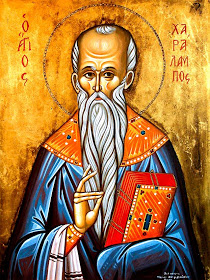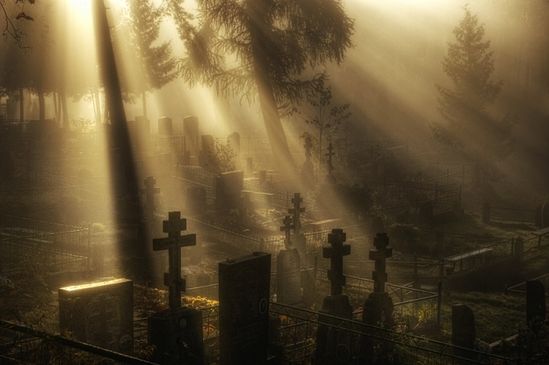 The first week of the Holy Forty Days of Lent, in the words of our pious ancestors and all Orthodox Christians, is called the dawn of abstinence, the week of purity. This week the Church convinces its children to come out of that sinful state into which the whole human race fell and lost paradise through our first parents’ lack of restraint, and which each of us only increases through our own sins; to come out by the path of faith, prayer, humility, and God-pleasing fasting. This is the time of repentance, says the Church, this is the day of salvation, the door to fasting: Be vigilant my soul, and shut the door to the passions; gaze upward toward the Lord.
The first week of the Holy Forty Days of Lent, in the words of our pious ancestors and all Orthodox Christians, is called the dawn of abstinence, the week of purity. This week the Church convinces its children to come out of that sinful state into which the whole human race fell and lost paradise through our first parents’ lack of restraint, and which each of us only increases through our own sins; to come out by the path of faith, prayer, humility, and God-pleasing fasting. This is the time of repentance, says the Church, this is the day of salvation, the door to fasting: Be vigilant my soul, and shut the door to the passions; gaze upward toward the Lord.
The First Week Of Great Lent: The Dawn Of Abstinence
The Great Canon Of St. Andrew Of Crete. Monday Of The First Week
On Monday of the First Week of Lent, during Great Compline, after Psalm 69, the Canon is sung. The Eirmosi are sung twice, at the beginning and end of each Song. Before each Troparion we make the sign of the Cross and bow three times.
Ode 1
Tone 6
Eirmos: He is my Helper and Protector, and has become my salvation. This is my God and I will glorify Him. My father's God and I will exalt Him. For gloriously has He been glorified. (Exodus 15:2,1; Psalm 117:14)
Catechetical Homily of Ecumenical Patriarch Bartholomew on the beginning of Holy and Great Lent, 2020
The Ecumenical Patriarchate has published Patriarch Bartholomew’s Catechetical Homily at the opening of Holy and Great Lent (2020).
+ BARTHOLOMEW
BY GOD’S MERCY
ARCHBISHOP OF CONSTANTINOPLE – NEW ROME
AND ECUMENICAL PATRIARCH
TO THE PLENITUDE OF THE CHURCH,
MAY THE GRACE AND PEACE
OF OUR LORD AND SAVIOR JESUS CHRIST,
TOGETHER WITH OUR PRAYER, BLESSING AND FORGIVENESS
BE WITH YOU ALL
We offer hymns of thanks to the God of love as once again we enter Holy and Great Lent, the arena of ascetic struggle, fasting and abstinence, of vigilance and spiritual awareness, of guarding our senses and prayer, of humility and self-knowledge. We are commencing a new and blessed pilgrimage toward Holy Pascha, which has “opened for us the gates of paradise.”
Saint Haralambos the Holy Martyr of Magnesia
 This great saint, Haralambos, was a bishop in Magnesia who suffered for Christ in his 113th year. When a terrible persecution began during the reign of Emperor Septimius Severus, the elderly Haralambos did not hide from the persecutors. Instead, he freely and openly preached the Christian Faith. He endured all tortures as though he were in someone else’s body. When they skinned him alive, the forgiving elder said to the emperor’s soldiers: “Thank you, my brethren, for in scraping my old body you renew my spirit for a new eternal life.” He worked many miracles and converted many to the Faith. Even the emperor’s daughter, Galina, abandoned the idolatry of her father and became a Christian. Condemned to death and brought to the place of execution, St. Haralambos raised his hands to heaven and prayed to God for all people, that God would grant them bodily health and spiritual salvation and that He would multiply their fruit of the earth: “O Lord, Thou knowest that men are flesh and blood; forgive them their sins and pour out Thy grace on all!” After praying, this holy elder gave up his soul to God before the executioner lowered the sword on his neck. He suffered in the year 202. The emperor’s daughter, Galina, removed his body and honourably buried it.
This great saint, Haralambos, was a bishop in Magnesia who suffered for Christ in his 113th year. When a terrible persecution began during the reign of Emperor Septimius Severus, the elderly Haralambos did not hide from the persecutors. Instead, he freely and openly preached the Christian Faith. He endured all tortures as though he were in someone else’s body. When they skinned him alive, the forgiving elder said to the emperor’s soldiers: “Thank you, my brethren, for in scraping my old body you renew my spirit for a new eternal life.” He worked many miracles and converted many to the Faith. Even the emperor’s daughter, Galina, abandoned the idolatry of her father and became a Christian. Condemned to death and brought to the place of execution, St. Haralambos raised his hands to heaven and prayed to God for all people, that God would grant them bodily health and spiritual salvation and that He would multiply their fruit of the earth: “O Lord, Thou knowest that men are flesh and blood; forgive them their sins and pour out Thy grace on all!” After praying, this holy elder gave up his soul to God before the executioner lowered the sword on his neck. He suffered in the year 202. The emperor’s daughter, Galina, removed his body and honourably buried it.
Memorial Saturday: Our love in Christ makes our departed ones alive
 On Memorial Saturday just before the Meatfare week, the Holy Church is calling u sto pray for the repose of the souls of our departed relatives who fell asleep in the Lord in the hope of the Ressurection and the eternal life.
On Memorial Saturday just before the Meatfare week, the Holy Church is calling u sto pray for the repose of the souls of our departed relatives who fell asleep in the Lord in the hope of the Ressurection and the eternal life.
In order to understand the importance of offering our prayers for the departed ones, it is necessary to have in mind that Christianity is religion of love. Christ hasn’t left to us, his disciples some teaching about an individual salvation but he has left the commandment to love one another. Love is the foundation and the essence of the Church teaching. The sin is always a lack of love and therefore it is segregation, isolation, a war against everyone. Delivering our prayers for our departed ones means that we meet them in Christ. Christ doesn’t make difference between the dead and the living because everyone is alive in Christ. Loving Christ we do love everyone in Him, loving everyone in Him, we do love Christ. Our love in Christ makes our departed ones alive.






